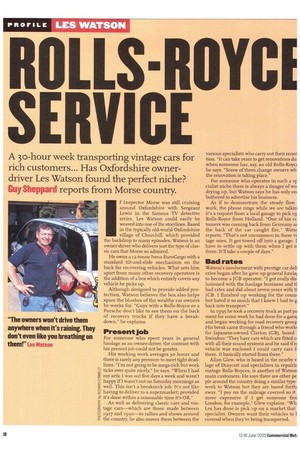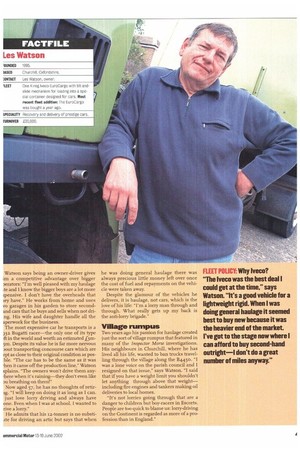ROLLS-1101'e!
Page 40

Page 41

If you've noticed an error in this article please click here to report it so we can fix it.
SERVICE
A 30-hour week transporting vintage cars for rich customers... Has Oxfordshire ownerdriver Les Watson found the perfect niche? Guy Sheppard reports from Morse country.
f Inspector Morse was still cruising around Oxfordshire with Sergeant Lewis in the famous TV detective series, Les Watson could easily be weaved into one of the storylines. Based in the typically old-world Oxfordshire village of Churchill, which provided the backdrop to many episodes, Watson is an owner-driver who delivers just the type of dassic cars that Morse so admired.
He owns a ta-tonne Iveco EuroCargo with a standard tilt-and-slide mechanism on the back for recovering vehicles. What sets him apart from many other recovery operators is the addition of a box which entirely covers any vehicle he picks up.
Although designed to provide added protection, Watson believes the box also helps spare the blushes of the wealthy car owners he works for. "Guys with a Rolls-Royce or a Porsche don't like to see them on the back of recovery trucks if they have a breakdown," he explains.
Present job
For someone who spent years in general haulage as an owner-driver, the contrast with his present job could not be greater.
His working week averages 30 hours and there is rarely any pressure to meet tight deadlines. "I'm not going to be mega-rich but work ticks over quite nicely," he says. "When I had 5 my artic I was out five days a week and wasn't 0 happy if I wasn't out on Saturday mornings as well. This isn't a breakneck job. It's not like having to deliver to a supermarket; provided it's done within a reasonable time it's OK."
As well as delivering classic cars and vintage cars—which are those made between 1917 and 193o—to rallies and shows around the country, he also moves them between the various specialists who carry out their renos lion. "It can take years to get renovations do when someone has, say, an old Rolls-Royct he says. "Some of them change owners wh the renovation is taking place."
For someone who operates in such a sr cialist niche there is always a danger of wo drying up, but Watson says he has only on bothered to advertise his business.
As if to demonstrate the steady flow work, the phone rings while we are talkin it's a request from a local garage to pick (IF RollsRoyce from Holland. "One of his cu tomers was coming back from Germany at the back of the car caught fire," Wats( reports. "That's not uncommon in these vi tage ones. It got towed off into a garage. I have to settle up with them when I get o there. It'll take a couple of days."
Bad rates
Watson's involvement with prestige car deli eries began after he gave up general haulai to become a JCB operator: "I got really dis lusioned with the haulage business and ti bad rates and did about seven years with tl JCB. I finished up working for the couru but hated it so much that I knew I had to g back into transport."
In 19 95 he took a recovery truck as part pa ment for some work he had done for a garal and began working for road recovery grour His break came through a friend who work( for Japanese-owned Clarion (GB), based. Swindon: "They have cars which are fitted o with all their sound systems and he said if n vehicle was enclosed I could carry cars f, them. It basically started from there."
Allan Glew, who is based in the nearby v lage of Draycott and specialises in repairir vintage Rolls-Royces, is another of Watson main customers. He says there are other pe pie around the country doing a similar type work to Watson but they are based furth, away. "I pay on the mileage covered so it more expensive if I get someone fro] London, for example," Glew explains. "Wh Les has done is pick up on a market that specialist. Owners want their vehicles to covered when they're being transported. Watson says being an owner-driver gives im a competitive advantage over bigger 3erators: "I'm well pleased with my haulage Ite and I know the bigger boys are a lot more (pensive. I don't have the overheads that ley have." He works from home and uses vo garages in his garden to store secondand cars that he buys and sells when not dring. His wife and daughter handle all the aperwork for the business.
The most expensive car he transports is a )32 Bugatti racer—the only one of its type .ft in the world and worth an estimated L3m5m. Despite its value he is far more nervous out transporting concourse cars which are apt as close to their original condition as posble. "The car has to be the same as it was hen it came off the production line," Watson plains. "The owners won't drive them anyhere when it's raining—they don't even like 3u breathing on them!"
Now aged 57, he has no thoughts of retirig. "I will keep on doing it as long as I can. just love lorry driving and always have one. Even when I was at school, I wanted to rive a lorry."
He admits that his ra-tonner is no substiite for driving an artic but says that when
he was doing general haulage there was always precious little money left over once the cost of fuel and repayments on the vehicle were taken away.
Despite the glamour of the vehicles he delivers, it is haulage, not cars, which is the love of his life: "I'm a lorry man through and through. What really gets up my back is the anti-lorry brigade."
Village rumpus
Two years ago his passion for haulage created just the sort of village rumpus that featured in many of the Inspector Morse investigations. His neighbours in Churchill, where he has lived all his life, wanted to ban trucks travelling through the village along the 1105o. "I was a lone voice on the parish council and I resigned on that issue," says Watson. "I said that if you have a weight limit you shouldn't let anything through above that weight— including fire engines and tankers making oil deliveries to local homes.
Its not lorries going through that are a danger to children but boy-racers in Escorts. People are too quick to blame us: lorry-driving on the Continent is regarded as more of a profession than in England."




















































































































































